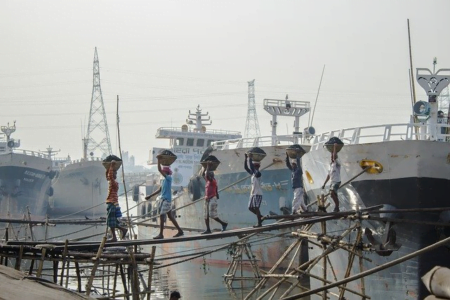International Labour Day
Every year 1st May is observed as May Day and is also known as International Labour Day worldwide.
- The day is observed as an occasion to commemorate the contributions of labourers and the working class.
- The International Labour Organization, a United Nations agency, works towards setting international labour standards.
History of Labour Day
- In 1889, the Marxist International Socialist Congress adopted a resolution for a great international demonstration in which they demanded that the workers should not be made to work for more than 8 hours a day. After this, it became an annual event and May 1 was celebrated as Labour Day.
- Earlier, the labours were exploited as they were made to work for 15 hours a day and it was in the year 1886 that the workers came together and started raising their voice for their right. In the protest, they asked for working 8 hours a day and to be provided with paid leaves.
- In India, Labour Day was observed in the year 1923, in Chennai. This day was observed by the Labour Kisan Party of Hindustan. On this day, the communist leader Malayapuram Singaravelu Chettiar also asked the government that this day should be considered as a national holiday to symbolise the efforts and work of the workers. This day is also known as Kamgar Divas, Kamgar Din and Antrarashtriya Shramik Divas in India.
The theme of Labour Day 2021:
- The International Workers’ Day will be observed on May 1 and every year there is a common observance theme that symbolises the efforts of the labours. The theme of 2021 has not been announced yet, however, it will be announced soon. In 2019, the theme for labour day was, “Uniting Workers for Social and Economic Advancement.”
Global History and Significance:
- United States:
- Labour Day has its origins in the labour union movement in the United States in the 19th Century.
- However, the USA and Canada celebrate Labour day on the first Monday of September, every year.
- Labour day was designated as a day in support of workers by trade unions and socialist groups in the memory of the Haymarket affair of 1886 in Chicago, USA.
- Haymarket Affair was a peaceful rally in support of workers which led to a violent clash with the police, leading to severe casualties. Those who died were hailed as “Haymarket Martyrs”.
- Workers’ rights violations, straining work hours, poor working conditions, low wages and child labour were the issues highlighted in the protest.
- Europe:
- May Day was first celebrated on 1st May, 1890, after it was declared by the first International Congress of Socialist Parties in Europe in July 1889.
- USSR:
- The Soviet Union and the Eastern bloc nations started celebrating the Labour day after the Russian Revolution, 1917.
- New ideologies such as Marxism and Socialism inspired many socialist and communist groups and they attracted peasants and workers and made them an integral part of national movement.
How is Dr Ambedkar relevant to May Day?

Labour Day or May Day is celebrated all over the world and is a celebration of the working classes that is promoted by the international Labour movements. In India if workers have gotten any right, it is because of Dr Ambedkar hence not to remember Dr Ambedkar on Labour Day will be an injustice to Dr Ambedkar legacy.
Dr Ambedkar’s contribution towards society is immense but almost everyone ignores the role of Dr Ambedkar as a labour leader. The Department of Labour was established in the year November 1937 and Dr Ambedkar took over the Labour portfolio in July 1942. The policy formulation and planning for the development of irrigation and electric power was the major concern. It was the Labour Department, under the guidance of Dr Ambedkar, that decided to establish “Central Technical Power Board” (CTPB) for power system development, hydel power station sites, hydro-electric surveys, analysing problems of electricity generation and thermal power station investigation.
If there is any one person who secured the rights of labourers in India, it was none other than Babasaheb Ambedkar. Without Dr Babasaheb Ambedkar, today the future of India workers would have been in pitch darkness.
Contribution of Dr. BR. Ambedkar for labour rights as follows:
- Equal pay for equal work irrespective of sex
Dr. Ambedkar was the first person who brought “Equal pay for equal work irrespective of sex” in India for all Industrial workers, when he was the Labour Minister in the Viceroy Executive Council. - Labour Rights in India
Without Dr. Ambedkar, most of the protective and benevolent rights enjoyed by the Labourers in India would have been a big question mark.
As the Labour Member of the Viceroy’s Executive Council between 1942 and 1946,his contribution to Labour welfare is quite significant.
Here is a summary.- Reduction in Factory Working Hours (8 hours duty) Today the working hours in India in a day is ,a shift of 8 hours. Dr. Ambedkar brought this 8 hours ‘shift’ in India and reduced the working hours from 12 hours to 8 hours.
- Tripartite Labour Conference: On August 7, 1942 he called for the Tripartite Labour Conference in New Delhi. The objects were namely, the laying down of a procedure for the settlement of industrial disputes and the discussion of all matters of All-India importance as between Labour and Capital. The great achievement of the Tripartite Conference is the fundamental change it has brought about in the outlook of Government and of Employers and of Employees on labour problems, Establishment of Employment Exchanges, and Collection of Statistics under the Industrial Statistics Act.
- Law for Women Labour in India
- Mines Maternity Benefit Act,
- Women Labour welfare fund.
- Women and Child, Labour Protection Act,
- Maternity Benefit for women Labour,
- Restoration of Ban on Employment of Women on Underground Work in Coal Mines
- Compulsory Recognition of Trade Unions:
Indian Trade Unions Act was enacted in 1926. This act helped only to register the trade unions, not approved by the government. On 8 November, 1943 he brought the Indian Trade Unions (Amendment) Bill for compulsory recognition of trade unions. The Bill had three important features. They are to compel an employer to recognise a trade union, to imposes certain conditions on a trade union in order to make the trade union, to make non-recognition by an employer of a trade union, which has observed all the conditions prescribed in this measure and which has therefore qualified itself for recognition, an offence which is made punishable by law. - Employment Exchanges in India:
Dr.Ambedkar was instrumental in bringing the establishment of employment exchanges. - Employees State Insurance (ESI):
ESI helps the workers with medical care, medical leave, physically disabled during working injuries as compensation Insurance for providing various facilities. Dr.Ambedkar enacted and brought it for the benefit of workers. Actually India only brought ‘Insurance Act’ as the first nation among the East Asian countries. Credit goes to Dr.Ambedkar . - Minimum Wages:
For fixing minimum wages for labour, Dr. Ambedkar was instrumental in drafting legislation on November 28, 1942. - Coal and Mica Mines Provident Fund:
* At the time, Coal Industry played a vital role in our country’s economy. Due to this, Dr.Ambedkar enacted the Coal Mines Safety (Stowing) Amendment Bill for the benefit of the workers on January 31st, 1944.
* On 8th April 1945, he brought the Mica Mines Labour Welfare Fund which helped the workers with housing, water supplies, education, entertainment, improvement of educational facilities and standards of living among the workers, including nutrition, amelioration of social conditions and the provision of recreation and transport facilities, the improvement of public health and sanitation, the prevention of disease, the provision of medical facilities. - Labour Welfare Funds:
Dr.Ambedkar set up an Advisory Committee to advise on matters arising out of the Labour Welfare under B.P.Agarkar. Later he promulgated it on January, 1944. - Technical Training Scheme and Skilled Workers:
- Maternity Benefit Act:
- Dearness Allowance (DA)
- Holidays with Pay for Factory Workers
- Health Insurance for Industrial Workers
- The Legal Strike.
- Provident Fund Act.
- Revision of Scale of Pay for Employees.
Constitutional Provisions Related to Labour
- Indian constitution provides numerous safeguards for the protection of labour rights. These safeguards are in the form of fundamental rights and the Directive principle of State policy.
- Article 14 commands the State to treat any person equally before the law.
- Article (19) (1) (c) grants citizens the right to form associations or unions.
- Article 21 promises protection of life and personal liberty.
- Article 23 prohibits forced labour.
- Article 24 prohibits employment of children below the age of fourteen years.
- Article 39(a) provides that the State shall secure to its citizens equal right to an adequate means of livelihood.
- Article 41 provides that within the limits of its economic capacity the State shall secure for the Right to work and education.
- Article 42 instructs the State to make provisions for securing just and humane conditions of work and for maternity relief.
- Article 43 orders the State to secure a living wage, decent conditions of work and social and cultural opportunities to all workers through legislation or economic organisation.
- Article 43A provides for the participation of workers in Management of Industries through legislation.
Legal Provisions
- Parliament has passed 3 labour code bills aimed at labour welfare reforms covering more than 50 crores organized and unorganized workers in the country.
- These three Bills are
- Social Security Code, 2020.
- Code on Occupational Safety, Health & Working Conditions Code, 2020
- Industrial Relations Code, 2020



